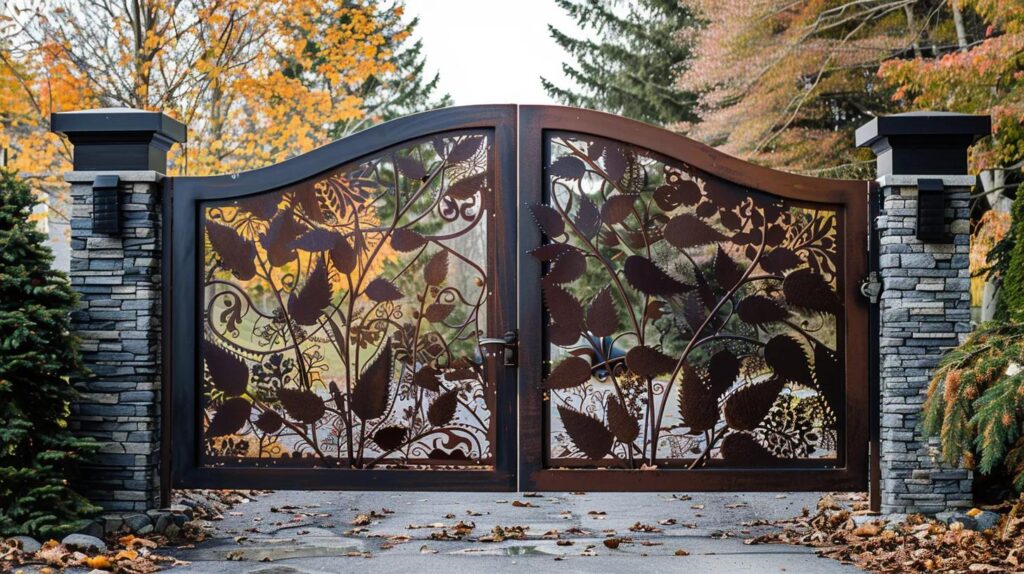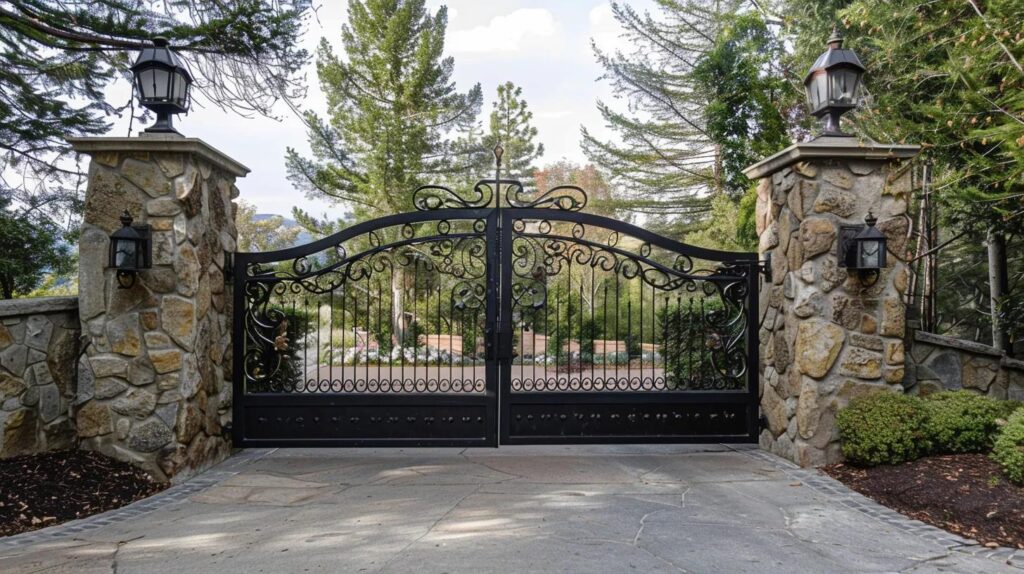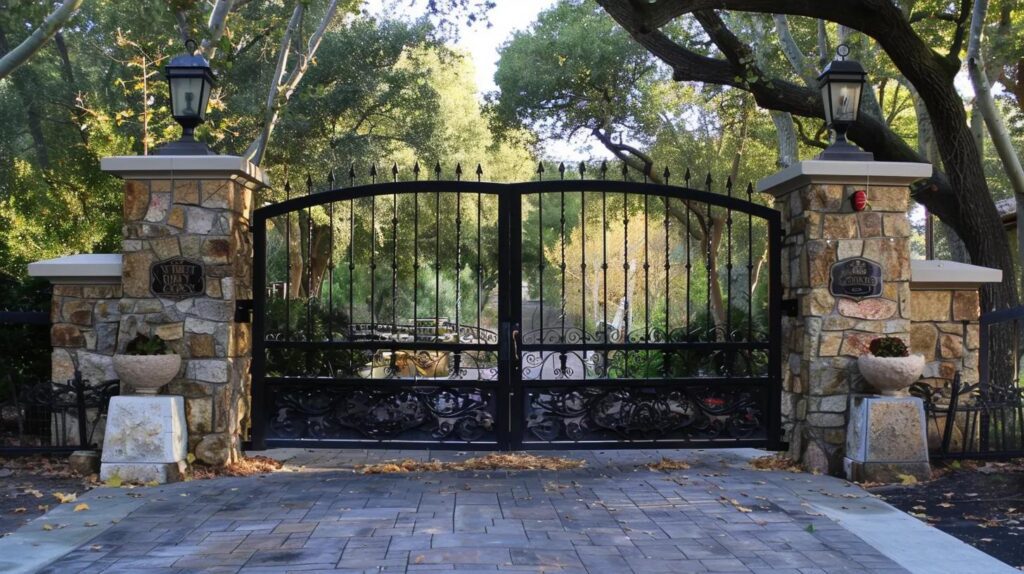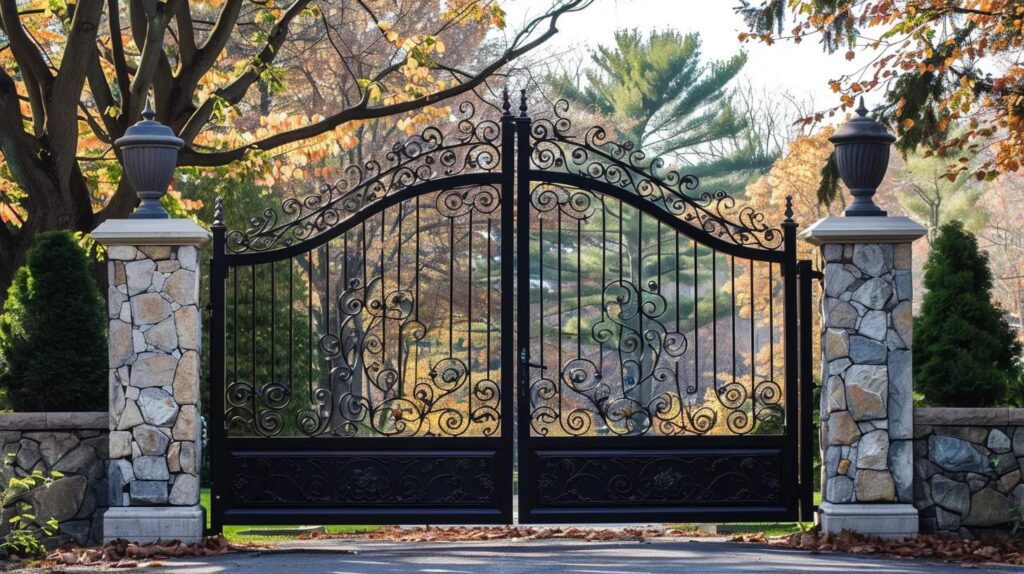Key Factors Influencing Custom Gate Prices for Residences

Custom gate pricing is complex, with costs influenced by various factors essential for property owners and business managers in Mississauga, Ontario. Understanding how materials, style, size, automation, installation, and customization impact the final price helps control budgets while ensuring safety and aesthetics. This guide explains which gate materials are best suited for different applications, compares designs ranging from swing to sliding gates, and discusses the costs and benefits of gate automation, as well as the pros and cons of professional versus DIY installation. Ultimately, investing in a quality custom gate improves security, convenience, and home value.
Transitioning to the detailed discussion, below are the primary factors that influence custom gate pricing in residential projects.
What Are the Main Factors That Influence Custom Gate Pricing?
Several key factors determine both the initial and long-term costs of a custom gate. These include the choice of gate materials, design style, overall size, automation features, and installation and labor requirements. Each factor affects pricing in unique ways, and understanding these elements helps in making well-informed decisions.
How Do Gate Materials Affect the Overall Cost?
Gate material is crucial as it influences both appearance and durability. Options like wood, metal, or composite vary in cost due to differences in raw material prices, processing, and finishing. Premium woods (e.g., cedar, redwood) often cost more than basic pine because of better resistance to rot and insects. Similarly, metals such as stainless steel or wrought iron add design value but are usually more expensive than aluminum or composite alternatives. In addition, materials that require less upkeep, such as steel or composite, may have a higher initial cost but yield lower long-term maintenance expenses.
Why Does Gate Style Change the Price of a Custom Gate?
Different styles, from traditional swinging to modern sliding gates, come with unique pricing structures. A simple swing gate may be more affordable because of its straightforward design and minimal hardware needs. In contrast, sliding gates typically involve complex track systems and additional labor, raising production and installation costs. Moreover, ornate or custom designs often require skilled craftsmanship and extra finishing work, which increases the overall price. Balancing visual appeal with practical functionality is key to selecting the right style within budget.
How Does Gate Size Influence Pricing?
Gate size directly affects cost because larger gates need more material and stronger support. Bigger dimensions result in higher material costs and may require extra structural reinforcements and more labor during installation. Larger gates also tend to incur higher maintenance and repair expenses due to their complexity. Additionally, the size of a gate can affect the type of automation system required, with larger gates needing more powerful motors and sensors. Accurate measurements and clear communication of property dimensions help ensure correct estimates and prevent unexpected cost overruns.
What Role Does Automation Play in Gate Pricing?
Automation increases both the convenience and cost of a custom gate. Automated systems utilize motors, access control devices, and safety sensors, adding to both installation expenses and ongoing maintenance. The type of motor—whether hydraulic, electric, or pneumatic—and features like remote control and smartphone integration contribute substantially to the price. Moreover, advanced access control systems (keypad, biometric, RFID) and safety features (sensors, emergency stops) are necessary for compliance and add additional costs. While automation offers benefits like increased security and convenience, it does require balancing the investment against long-term benefits.
How Do Installation and Labor Costs Affect the Final Price?
Professional installation is integral to custom gate pricing. Labor costs can vary based on design complexity, site preparation, and local wage levels in Mississauga. Installation tasks include precise measurements, foundation work, electrical wiring for automation, and sometimes structural modifications. Additionally, permit fees and local regulations may require inspections and additional work, further increasing cost. Though professional installation generally has a higher upfront investment, it ensures long-term performance and safety.
How Does Customization Impact the Price of Your Gate?
Customization allows property owners to add distinctive features such as engraved designs, color finishes, decorative lighting, or integrated smart technology. Each additional feature requires extra work hours and specialized materials, incrementally raising the cost. Customization may also involve consulting fees and design revisions. While a personalized gate can increase property value and aesthetic appeal, it is important to balance these enhancements with overall cost-effectiveness.

Which Gate Materials Are Best and How Do They Affect Pricing?
The choice of gate material critically influences durability, appearance, and maintenance. Common options include wood, metal, and composite, each offering distinct benefits and challenges.
What Are the Cost Differences Between Wood, Metal, and Composite Gates?
Wood gates provide a warm, natural appearance and can vary widely in price. Basic options like pine are economical but may require frequent upkeep, while premium woods like cedar and redwood offer enhanced durability at a higher cost. Metal gates, such as those made of steel or aluminum, generally have higher upfront costs but offer strength and modern aesthetics. Composite gates combine recycled fibers and polymers to mimic wood’s appearance while providing increased longevity and reduced maintenance. Each material has trade-offs between initial cost and ongoing expenses.
How Do Specific Wood Types Like Pine, Cedar, and Redwood Vary in Price?
Pine is widely used for its affordability, although it may require regular sealing or staining to resist weather damage. Cedar offers natural resistance and an attractive grain, leading to moderately higher prices. Redwood, known for superior durability and minimal maintenance, commands the highest price. The choice among these options affects both the gate’s aesthetic appeal and its long-term care requirements.
What Are the Benefits and Costs of Metal Gates Such as Steel and Aluminum?
Steel gates are preferred for their heavy-duty durability and robust design, but they are generally more expensive due to higher material costs and the need for protective coatings against rust. Aluminum gates provide a lightweight and corrosion-resistant alternative with a sleek appearance, often at a lower price point and with less maintenance. The decision between steel and aluminum depends on balancing required strength, long-term durability, and budget constraints.
How Does Composite Material Pricing Compare to Traditional Options?
Composite gates blend the natural look of wood with the durability of modern materials. Although their initial cost can be higher than basic wood options, they typically require less maintenance and offer a longer lifespan. This balance between aesthetics, durability, and upkeep makes composites an increasingly popular choice for homeowners looking for a cost-effective long-term solution.
How Do Different Gate Styles Impact Custom Gate Prices?
Gate style is a major cost determinant, with different designs offering varied levels of complexity and functionality. Common styles include swing, sliding, pedestrian, and driveway gates.
What Are the Price Considerations for Swing Gates?
Swing gates are traditional and widely used due to their simple mechanical operation, which minimizes component count and cost. However, if a swing gate is large, it may require extra reinforcement and quality hardware, increasing labor and material expenses. Ornamental details like ironwork or custom wood carvings can further add to the cost, though they provide a classic, attractive finish.
How Much Do Sliding Gates Typically Cost Compared to Other Styles?
Sliding gates incorporate tracks and specialized hardware that drive up the cost when compared to simpler swing gates. Precise track alignment and additional support work, including excavation and concrete work, increase both material and labor costs. Despite the higher cost, sliding gates offer benefits such as space efficiency and enhanced security, making them a favored choice for larger driveways and modern properties.
What Are Pedestrian and Driveway Gate Pricing Differences?
Pedestrian gates are generally compact and straightforward in design, making them more affordable. Their reduced size and mechanical simplicity lower both material and installation costs. In contrast, driveway gates are larger and often include automation features and heavy-duty components to handle vehicular traffic, resulting in a higher price. The choice between pedestrian and driveway gates depends largely on the intended function and security requirements.
How Does Gate Design Complexity Affect Style Pricing?
The complexity of a gate design directly impacts its cost. Intricate patterns, decorative elements, or custom fabrication techniques require additional labor, specialized tools, and higher-quality materials, which increase overall expenses. Conversely, simpler designs that focus on functionality can be produced more economically. Balancing aesthetic aspirations with budget limitations is crucial when choosing a design complexity that meets both visual and practical needs.
What Are the Costs and Benefits of Gate Automation?
Automating a gate transforms it into a smart entry system and adds convenience and enhanced security. However, this modernization incurs additional costs.
How Do Different Motor Types Influence Automation Costs?
The type of motor used in automation significantly influences cost. Basic electric motors are typically less expensive but may offer limited functionality. Variable-speed options and hydraulic motors, which provide smoother and more powerful performance, carry a higher price due to their complexity and maintenance requirements. Pneumatic motors, valued for their durability in harsh conditions, also affect overall pricing. The right motor choice balances performance needs with long-term repair and maintenance costs.
What Access Control Systems Are Available and How Do They Affect Price?
Access control systems range from simple remote controls and keypads to sophisticated biometric and smartphone-integrated systems. More advanced solutions deliver features like real-time monitoring and automated alerts, which enhance security but also increase cost due to additional hardware requirements and potential subscription fees. The selection of an access control system should align with both security needs and budget considerations.
How Do Safety Features Impact the Cost of Automated Gates?
Safety features, such as obstruction sensors, photoelectric beams, and emergency stop buttons, add both to the component and installation costs of an automated gate. These features are critical for protecting users and ensuring compliance with safety regulations. Although they increase the upfront cost, they are an important investment for preventing accidents and reducing future liability.
What Is the Typical Price Range for Gate Automation Systems?
The price of gate automation systems can vary widely. Entry-level systems can begin at a few hundred dollars, while more sophisticated setups with premium components may run several thousand dollars. In many cases, the cost of a fully automated system can exceed that of a manual gate by up to 50% or more. However, the investment is often offset by reduced manual labor and greater security over time.

How Much Does Professional Gate Installation Cost and What Does It Include?
Professional gate installation involves meticulous work from foundation preparation to the integration of automated systems. The final cost is affected by labor rates, permit fees, and specific site requirements.
What Are Typical Labor Costs for Gate Installation?
Labor costs depend on the complexity of the gate design and the local market conditions in Mississauga. Tasks include precise alignment, mounting, and electrical wiring for automation. Labor typically accounts for 30% to 50% of the total cost, and detailed site assessments and customization requirements may further influence the rate. Detailed cost breakdowns from installers help ensure transparent pricing.
How Do Permit Fees and Local Regulations Affect Installation Costs?
Local building codes and safety regulations necessitate permit fees and inspections. These fees vary based on the scope of the project and local requirements. Additional site-related challenges, such as difficult soil conditions or proximity to power lines, may incur extra expenses. Including these fees in the initial budget helps avoid unexpected costs during installation.
What Site Preparation Is Required and How Does It Influence Price?
Site preparation, such as leveling the ground, removing obstacles, or constructing a new foundation, is essential for the gate’s stability and longevity. Sometimes, extra work like installing electrical conduits for automation is required. These preparatory tasks add to both material costs and labor, but they are crucial for long-term performance.
How Long Does Gate Installation Usually Take?
Installation timelines vary based on the complexity of the design and site conditions. Simple installations might be completed in a single day, while projects involving automation or extensive civil modifications can take several days. Coordination among contractors, inspectors, and suppliers is critical to complete the installation on schedule.
How Can You Get an Accurate Quote for Your Custom Gate?
Obtaining an accurate custom gate quote requires sharing detailed project information with multiple providers. A transparent quote should include material, labor, automation features, and any site preparation costs.
What Information Should You Provide When Requesting a Quote?
When requesting a quote, provide specific details including the desired gate style, precise measurements, preferred materials, and any extra customization such as automation or access control features. Sharing site photographs, existing layout details, and any regulatory or permit requirements will help contractors offer a more accurate estimate.
How Do You Compare Quotes From Different Gate Providers?
Evaluating quotes involves reviewing the itemized costs for materials, labor, permits, and any additional fees. Consider factors such as warranties, service plans, and provider reputation through customer reviews and past projects. A detailed comparison helps in selecting a provider that balances quality and cost-effectiveness.
What Questions Should You Ask to Understand Pricing Fully?
Ask for clarification on potential hidden costs, warranty details, and maintenance packages. Inquire about the timeline for installation and possible additional fees related to site adjustments or automation upgrades. Detailed answers ensure that the full project cost is understood in advance.
Should You Choose DIY or Professional Installation? What Are the Cost Differences?
Choosing between DIY and professional installation impacts both cost and performance. While DIY may reduce labor expenses, it carries risks that can result in costly mistakes.
How Much Can You Save With DIY Gate Installation?
Opting for DIY installation can save money by eliminating professional labor fees, sometimes reducing expenses by up to 50%. However, savings depend on the homeowner’s skill level, the quality of tools, and familiarity with gate systems. Simple manual installations may yield significant savings, but complex automated systems can be challenging.
What Are the Risks and Benefits of DIY vs. Professional Installation?
DIY projects offer cost savings and complete control over the project, but risks include improper installation, safety hazards, and potential equipment damage. Professional installers ensure compliance with local codes, offer warranties, and provide post-installation support, making them the preferred choice for complex or safety-critical installations.
When Is Professional Installation Recommended?
Professional installation is recommended for projects involving advanced automation, large-scale structures, or challenging site conditions. If access control systems or safety features are integrated, professional expertise minimizes errors and ensures regulatory compliance. For comprehensive and reliable results, professional installation is often the best long-term investment.

What Are the Long-Term Maintenance and Security Costs for Custom Gates?
Beyond initial installation, long-term costs include routine maintenance and security enhancements. These ongoing expenses impact the overall investment in a custom gate.
How Do Maintenance Needs Vary by Gate Material?
Maintenance requirements differ by material. Wood gates typically need periodic sealing, painting, or staining, while metal gates may require rust prevention treatments and repainting. Composite gates usually need less upkeep, making them more cost-effective over time despite a higher initial cost. Choosing a material with lower maintenance demands can reduce long-term repair expenses.
What Are Typical Repair Costs for Different Gate Types?
Repair costs vary based on design and material durability. Minor repairs on wood gates might cost a few hundred dollars, while more complex repairs for automated metal gates can cost significantly more. Proactive maintenance can lower the frequency and expense of repairs.
How Do Security Features Like Locks and Cameras Affect Pricing?
Incorporating high-security locks, video cameras, and alarm systems increases the overall installation cost due to additional hardware and potential subscription fees. However, these features enhance property security and may lower insurance premiums, providing long-term value.
What Is the Expected Lifespan of Various Gate Materials?
A well-maintained wood gate may last 15–20 years, while quality metal gates with corrosion protection can exceed 20–30 years. Composite gates often provide similar or extended lifespans with less upkeep. Evaluating expected lifespans and maintenance costs helps in estimating the total cost of ownership.
Final Thoughts
This article has provided a comprehensive look at the key factors influencing custom gate prices, including materials, design, size, automation, installation, and long-term maintenance. By carefully considering these elements, property owners in Mississauga and beyond can make informed decisions that balance upfront costs with long-term value, ensuring enhanced security, functionality, and aesthetic appeal. Ultimately, a quality custom gate serves as a valuable home improvement that meets both practical needs and personal style preferences.
Frequently Asked Questions
Q: How do I determine the best gate material for my home?
A: Consider factors like aesthetics, durability, and maintenance needs. Wood offers a natural look but requires regular upkeep, metal provides strength and longevity, and composite options deliver low maintenance with modern appeal.
Q: What factors should I consider when adding automation to my gate?
A: Key factors include the motor type, access control technology, integration with security systems, and safety features. Each component drives the cost and benefits of an automated system, so professional installation is recommended for optimal performance.
Q: Is professional installation worth the extra cost over DIY?
A: Yes. Professional installation ensures proper setup, compliance with regulations, and long-term performance. While DIY may reduce upfront expenses, mistakes can lead to costly repairs and decreased reliability.
Q: How do permit fees and local regulations affect my gate project?
A: Municipalities require permits and inspections, which add to installation costs. These fees vary by region and may include charges related to structural, safety, and environmental standards.
Q: What maintenance practices should I follow to extend the lifespan of my custom gate?
A: Routine cleaning, painting, or sealing, and regular inspections of mechanical components are essential. For automated systems, periodic checks on motors and wiring help prevent expensive repairs.
Q: How can I compare quotes from different custom gate providers?
A: Ensure each quote includes detailed breakdowns of materials, labor, permits, and additional fees. Check provider reviews, warranties, and past work to make an informed decision.
Q: What are the benefits of investing in a fully automated gate system?
A: Fully automated gates offer remote control convenience, enhanced security through integrated access control, and a modern aesthetic that boosts property value. Despite higher upfront costs, the benefits include reduced manual labor and improved long-term functionality.
